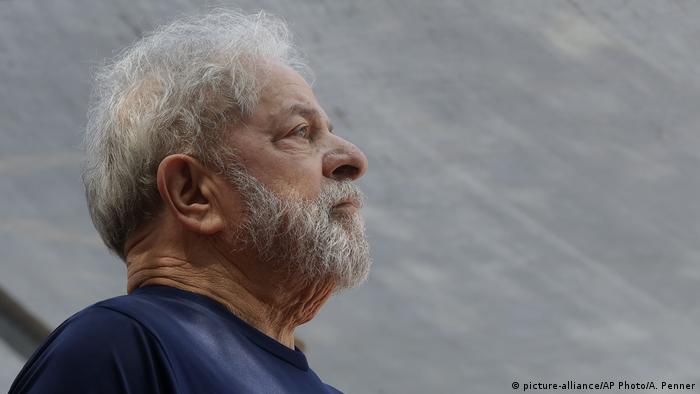A year ago, the Brazilians chose the right-wing populists Jair Bolsonaro to be their new President. At that time, the country was deeply divided. However, the polarization today is not nearly as pronounced.

“In October of 2018, our country experienced a polarisation like never before,” recalls Jairo Nicolau, a Brazilian political scientist from the Fundação Getúlio Vargas in Rio de Janeiro. “Whole families are divided because of politics,” says Nicolau. “But my impression is that it is less radical.” And the sociologist Demétrio Magnoli says in a DW interview: “Today, we have in Brazil two different temperatures. In social networks it is still hot. But in the society that have cooled the tensions, and social polarisation in Brazil has declined in step with Bolsonaros popularity.”
Latest Figures from the Brazilian polling Institute Ibope, according to the consent of the President by a 49 percent to the office, dropped in January to 31 percent in September. A good third of the respondents rate his work as bad – in January there were only eleven per cent. “A dramatic loss,” says Magnoli. The falling poll numbers counters Bolsonaro with increasingly fierce slogans in the social networks. “The government escalated its rhetoric, the more popularity you lose,” says Magnoli. “This is not a particularly good strategy.”
Bolsonaros Interests
In fact, Brazil’s government have to show for hardly anything. The Executive appears to be distressingly weak. So it was not about Bolsonaros government, but the Congress, which had drafted the recently adopted pension reform. “The economic agenda is not pushed by the government, but by Parliament. Although Brazil’s presidential system, the figure of the heads of state awards is actually a prominent position, are also likely to be the next economic reforms from Parliament. “Today, we have, in truth, not a presidential system, but a Semi-parliamentary system,” says Magnoli.

Protest with green oranges: The pension reform has been prepared by the Congress
Against the strong Parliament Bolsonaro is hardly. In the election campaign, he had announced, among other things, a de-ideologising of the public schools, stricter abortion laws, as well as the release of weapons for all citizens. Especially minorities feared at the time of their rights. But in the end, the Congress curbed the President on almost all levels.
The role of the Opposition
A weak image is meanwhile, the Opposition. “The Brazilian Left is collapsed, a unique process in the history of Brazil,” says the philosopher Vladimir Safatle in an interview with DW. “You cannot, on their dismissal to get over and a new beginning to start.”
From 2003 up to 2016, the one on the left had ruled party PT Brazil, so long as no other party. However, the social protests in 2013, they had no answers. In corruption scandals implicated in and responsible for the economic crises made it, lost it in 2016, the Power. The reasons of their failure have upgraded the PT never really, Safatle: “The Left loves to tell that they failed due to their qualities and not their faults. But Lula’s power system had irreconcilable internal contradictions that led to the Implosion. And since the Left is no longer able to develop an alternative Agenda.”

System power with internal contradictions: Lula da Silva in April 2018
The paralysis of the Opposition can be Bolsonaro, despite falling poll numbers in undisturbed reign. “Bolsonaro is supported by only 30 percent of the population, so by a minority. But it is better to have a small, organized group behind a large, which is disorganized.”
Promise of a conservative Revolution
The Brazilians had Bolsonaro, a Revolution from the right, promised to clean up the old certainties of the country. “This Revolution would throw back to Brazil to 100 years,” says Safatle, “and with disastrous consequences, for example in environmental policy.” The government have drawn from their ideological Beliefs no consequences from the ecological disasters of recent times, neither from the increasing deforestation of the rain forest from the devastating forest fires in the Amazon, or from the oil Spill in the North of Brazil.

Forest fires in the Amazon region, for ideological reasons, no consequences
“Add to that a social policy, which leads to further concentration of income. This is the policy that imploded in Chile. And will also lead you here in Brazil for the big Bang. It will just take a little longer, until it happens,” predicts Safatle. “And furthermore, running the Whole thing in an extremely authoritarian and militaristic-charged environment.” Clearly this will most with views of the exploding Numbers of police violence. “The extent of state violence against Black, poor and favela residents is incredible. This year alone, around 1,800 people from the police were killed”, so Safatle.
Mixed Between The Balance Sheet
How is it in Brazil? Ex-President Lula should be soon released from prison, this could ignite a new dynamic, believes Magnoli. “The dignity of Brazil, the political landscape by shaking. Ironically, this could help Lula’s release, but even of the government. Because of the support that Bolsonaro has, is mainly based on the rejection of Lula and the PT.”
Political scientist Jairo Nicolau believes, however, that the rejection of the PT decreases in the population – thanks to the revelations of an Internet platform, the references to judicial manipulation in the proceedings against Lula, on the other, because Bolsonaro could not hold many promise. “People wanted something New, but if that’s not admission, then, to reconsider the things. Lula is expected to be evaluated today, therefore, more positive than a year ago.”
A year after Bolsonaros choice sociologist Magnoli is therefore a mixed assessment: “There is hope that the economy starts – and the possibility that the government loses still more popularity and, of course.”